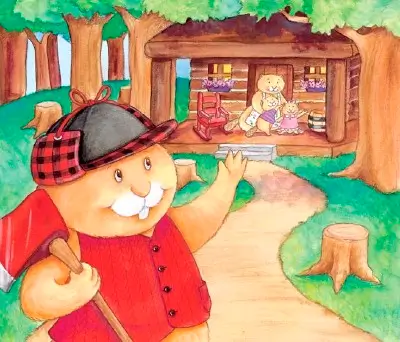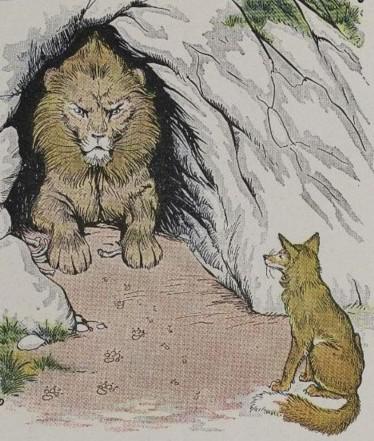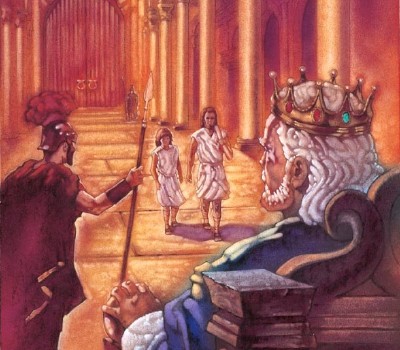 One day an old man named Geppetto sees a beautiful bluebird resting on a log. “This is a magic log for you,” whistles the bird. “It will make your dreams come true.” Not quite knowing what to make of the bird, Geppetto accepts the gift. He decides to carve a puppet from the wood.
One day an old man named Geppetto sees a beautiful bluebird resting on a log. “This is a magic log for you,” whistles the bird. “It will make your dreams come true.” Not quite knowing what to make of the bird, Geppetto accepts the gift. He decides to carve a puppet from the wood.
“I’m going to make a marvelous puppet that can laugh, dance, and turn
somersaults!” he says. Geppetto has always wanted a son.
Geppetto begins carving the wood. Using his tools, he whittles two feet, two legs, a body, two arms, and two hands. “Now all you need, dear puppet, is a kind face and a warm smile,” says the old man.
He sets about crafting two twinkly eyes, an upturned mouth, and a little nose. But the nose does not stay little. As soon as Geppetto finishes it, the nose grows and grows and grows.
“Such a mischievous nose!” cries the old man. “I will fix it at once.” Geppetto trims the nose to its proper size and steps back to admire the puppet. “I will call you Pinocchio,” he says.
When Pinocchio hears his name, he stands up on the workbench and winks at Geppetto. The old man’s heart fills with love. Pinocchio jumps from the bench and begins to walk around the room. “Look how easily you can move,” says Geppetto, filling with pride.
Pinocchio walks faster and faster and faster. As quick as a flash, Pinocchio darts out the door! “Come back, Pinocchio!” cries Geppetto. “You must obey me.”
The unruly Pinocchio does not listen and runs toward the town square. As he runs, Pinocchio’s nose grows. Geppetto tries to catch the puppet, but the old man lags behind. A policeman in the square sees the puppet dashing toward him, and, with an easy gesture, the policeman grabs Pinocchio by the nose and plucks him from the road. The puppet’s legs spin in the air. “Where are you going in such a hurry?” asks the angry policeman. “You should be in school.”
“Where are you going in such a hurry?” asks the angry policeman. “You should be in school.”
“I don’t want to go to school,” replies Pinocchio, speaking his first words. “I want to play all day.”
“That is very foolish,” says the policeman. “Don’t you know that if you run around like an animal, you will grow up to be a donkey, and everyone will make fun of you? How would you like that?” Pinocchio does not believe the policeman. An out-of-breath Geppetto appears and takes the naughty puppet home.
An out-of-breath Geppetto appears and takes the naughty puppet home.
“If you promise to be good, Pinocchio,” says Geppetto, “I’ll make you a suit of clothes like a real boy.”
Pinocchio’s eyes become wide, and he nods his head up and down
in excitement. Geppetto cannot afford fine fabric. He makes Pinocchio a suit out of colored paper, a pair of shoes from tree bark, and a pointed hat out of woven reeds.
Pinocchio models the suit in front of a mirror. “Oh, thank you, Father. I promise to be good. I will even go to school.”
Geppetto goes to his workbench and pulls a shiny coin from beneath a pile of rusty nails. “I have saved this coin for a long time,” he says with a smile. “Take it, Pinocchio. Go to the store and buy a book for school.”
Pinocchio sets off for the store immediately. He skips along imagining all the things he will learn at school. As he walks, he hears silly music playing dee-dee-deedle-dee, zum-de-dum-dum-dum. Curious, Pinocchio steps off the road and walks toward the music. Soon he sees a bright red tent with green flags.
“Puppet show today! Admission is only one coin!” shouts a man in a top hat. Pinocchio forgets his promise to Geppetto and runs to the tent and gives the man his coin. Pinocchio takes a seat as the lights dim, and the audience prepares for the show.
Bang! A spotlight hits the stage, and ten puppets drop from the ceiling and begin to dance. Pinocchio claps his hands with delight. The clacking sound of his wooden hands attracts the attention of all the performers.
“Look! There’s a puppet in the audience!” they shout. “Come join us on stage!” Eager to make friends, Pinocchio leaps over the seat in front of him, hops off the orchestra leader’s head, and lands on the stage. The other puppets embrace him as if meeting a long-lost friend.
Seeing the show stop, the man with the top hat grabs Pinocchio by the arm. “You troublemaker. You disrupted my show. I’ll teach you a lesson! I’m going to use you for firewood!” “Oh, please, sir,” says Pinocchio, suddenly crying. “Do not hurt me. I will leave at once. I promised my father, Geppetto, that I would go to school, but I came here instead. I gave you my only coin, and now I can’t buy a school book. I am very sorry I disrupted your show.”
“Oh, please, sir,” says Pinocchio, suddenly crying. “Do not hurt me. I will leave at once. I promised my father, Geppetto, that I would go to school, but I came here instead. I gave you my only coin, and now I can’t buy a school book. I am very sorry I disrupted your show.”
The puppet master sees that Pinocchio is speaking the truth. His icy heart warms. “Because you are truly sorry, I will not hurt you. Take these five coins and buy yourself a school book. Then buy a gift for your father.”
With the jingle-jangle of five coins in his pocket, Pinocchio continues on his way. He imagines all the wonderful gifts he will buy for Geppetto — a sharp knife for whittling, a sturdier workbench, and a new suit. Caught up in his thoughts and his whistling, Pinocchio does not see two beggars.
A blind cat and a lame fox stand by the side of the road. “Hey, kid,” says the cat with dark glasses. “Do I hear some coins jingling in your pocket?”
“We can show you how to turn a few coins into a hundred coins,” adds the fox, leaning on his crutch. “All you have to do is bury the coins in the money orchard. In thirty minutes, you’ll have a money tree.”
“Gosh, that sounds easy,” says Pinocchio. “Then I could buy ten suits for Geppetto and ten books for me.”
Just then, a bluebird in a tree calls to Pinocchio, “Don’t be foolish! Don’t be foolish!” As quick as a wink, the cat leaps at the bird while the fox, both feet steady on the ground, swings his crutch at it. The bird narrowly escapes.
“The money orchard is on the other side of those trees,” says the cat, composing himself and adjusting his glasses.
“We can take you there,” adds the fox, delicately lifting one foot.
Pinocchio agrees and follows the cat and fox to an open field. They show him where to bury his five coins. “Now you must return to the road and wait thirty minutes,” instructs the cat.
Pinocchio says good-bye to the cat and fox and does as he was told. After thirty minutes, he races back to the field and looks for the money tree. But the field is as empty as before. In the place where he had buried the coins, Pinocchio finds an empty hole. The poor puppet sinks to the ground and cries. If only he had been a good boy and gone straight to the store with his money. Now he has nothing.
But the field is as empty as before. In the place where he had buried the coins, Pinocchio finds an empty hole. The poor puppet sinks to the ground and cries. If only he had been a good boy and gone straight to the store with his money. Now he has nothing.
Overhead, Pinocchio hears the bird singing again. He looks up to see a beautiful fairy with long blonde hair and feathery wings. “Pinocchio,” she says. “If you really want to be a good boy, you will have to obey Geppetto and go to school. If you promise to do these things, I will give you the book you need and take you home.”
“Kind fairy, I will do as you say,” says Pinocchio. The fairy draws a book out from under her wing and hands it to the grateful puppet. Then she swings Pinocchio onto her back and flies him home.
Geppetto is relieved to see Pinocchio. “You were gone so long!” he says. “Did you go straight to the store?”
Already forgetting his promise to be good, Pinocchio lies. “Yes, Father,” he says. Pinocchio’s nose grows. It grows straight out the window, and five big crows land on it. Pinocchio cries at the sight and tells Geppetto the truth. “I promise to be good from now on,” he adds. At this, his nose shrinks to its original size.
“You are as good to me as a real boy,” says Geppetto, hugging the puppet.
The next day Pinocchio walks to school with his new book under his arm. He imagines what he will learn — letters, words, and numbers spin in his head.
“You look like a smart boy,” says a voice from the roadside. Pinocchio turns to see a round man sitting in a donkey cart.
“I am,” says Pinocchio. “I am going to school.”
“Why go to school if you are smart already?” asks the man. “Come with me, and I’ll show you a place where you can do as you please. It’s called Playland.”
“I don’t know,” stammers Pinocchio. “I want to be a good boy.”
“To be a bad boy you have to break rules. You can’t break rules in Playland because there are no rules,” says the man. As Pinocchio turns this over in his mind, a bluebird lands on the donkey.
“Don’t be foolish! Don’t be foolish!” sings the bird.
“Get away!” yells the round man, waving his crop.
“I’m not sure about this,” says Pinocchio, as the bird flies away. “But, okay, I’ll go.”
With one swoop of his pudgy arm, the round man places Pinocchio on the donkey’s back, and they set off.






